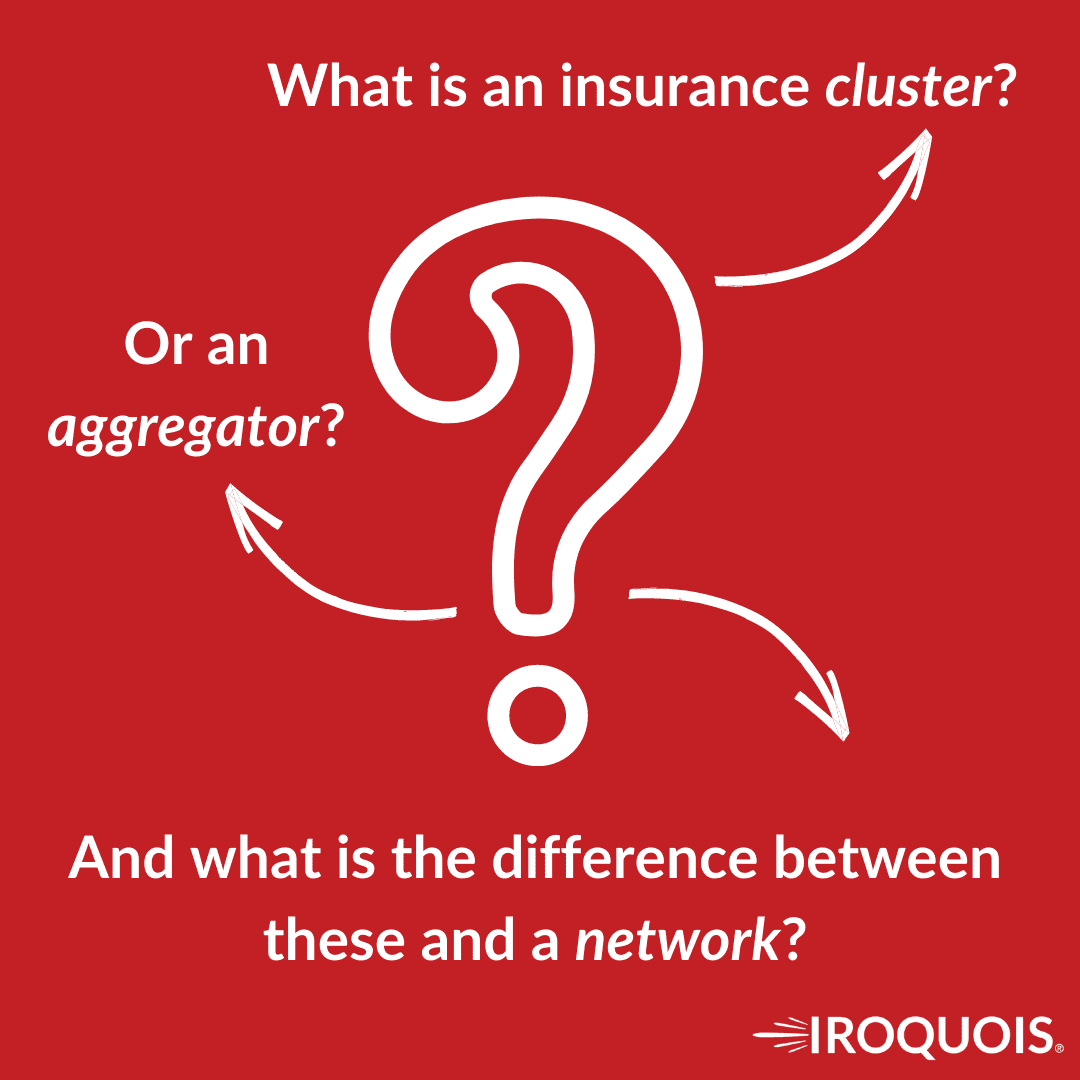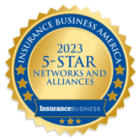Iroquois’ own Charlie Venus is the star of the show this week. We are clearing up one of the most common questions our industry receives. What is the difference between a cluster, an aggregator and an insurance network? After providing a base line definition of each, Charlie lets us know how The Iroquois Group differentiates from its competitors.
Edwin K. Morris (4s):
Welcome to the trusted adviser podcast brought to you by Iroquois Group. Iroquois is your trusted advisor in all things insurance. I am Edwin K. Morris, and with me is the one and only Charlie Venus. He’s with us today because we’re going to talk about something that’s close to home And something that will help us to gather a little more data about Iroquois. But before we do that, Charlie, what’s been the biggest thing on your plate in the world of insurance that you’ve seen change totally?
Charlie Venus (39s):
Wow. That’s a, that is a big question. Well, you know, I’ve been around so long. We had point in that there has been, there has been a lot of change, just a lot of change. I would say from when I first started my insurance career, the biggest change has been the move by all carriers to small business. You know, when I started, there weren’t any small business platforms so that tells you how long ago I started in the business. So over the last 40 years, there has been a movement to a small business platforms by all of the national carriers and now even what we call a regional carriers are trying to write more small businesses. And the key there is that small business, it tends to be very profitable.
Charlie Venus (1m 23s):
It tends to be sticky in that you don’t have to do a lot to renew it. A lot of it just renews automatically every year. And so from a carrier perspective, it’s almost like an annuity, the revenue that you get from the renewal there, that small business every year, can really fund your operations. And that’s been one of the biggest, biggest changes I’ve seen. And now I would say, you know, you’re seeing that technology push where things are becoming so, so much more automated.
Edwin K. Morris (1m 55s):
I can see that. I think that that kind of carpets a across a lot of different industries for revolutionary change in how things are done. One of the things that we want to talk about today is with Iroquois, there’s a couple of terms floating around out there and Iroquois itself as an organization is considered a network, correct?
Charlie Venus (2m 17s):
Correct.
Edwin K. Morris (2m 17s):
So can you explain what that is and what the differences are between a cluster, aggregator, and a network?
Charlie Venus (2m 25s):
Well, sure. And I’ll give you a, you know, what I believe is the definition. From a cluster standpoint, clusters were the first to start and they tended to be just small groups of agencies that banded together for a couple of specific reasons. And that was typically to improve their collective compensation from a carrier, improve access to insurance carriers and improve their competitive positions.
Edwin K. Morris (2m 52s):
When you were saying that, I hear co-op, it kind of sounds more like a small co-op of, of, of concerned, associated, competing but associated businesses that want to help each other.
Charlie Venus (3m 5s):
Correct. And, and again, you know, I told you that I’ve been around for a while, but when I went on the agency side, when I left the carrier side, the agency I joined was part of the cluster and the cluster had been formed about 20 or 30 years earlier for the sole purpose of those three things I just mentioned. Individually, they couldn’t get access to certain carriers. Collectively, they could. It gave them more buying power because of the collective premium. You know, I had a better position with those carriers and they got better compensation because their premiums were aggregated. And then you look at the aggregator piece. And I, to me, an aggregator is kind of a, like a cluster on steroids.
Charlie Venus (3m 48s):
Instead of being a small group, that’s a large group of agents that have banded together for those same primary three reasons. So it might be some other services that are provided, but again, it’s access, it’s compensation, and it’s a competitive position.
Edwin K. Morris (4m 4s):
So I’m just curious in that formation of the cluster and aggregator is, is this an actual other business? Is this, was it just a handshake agreement? How do those show up?
Charlie Venus (4m 17s):
It’s another business when you’re talking about the cluster, it’s a separate entity. And then all those agents are members of that entity. Aggregator is a separate entity. And then when you get to the network, now networks do all those things that the cluster and the aggregator does. But I think what distinguishes the network is that it goes beyond just those three primary objectives. You know, that the cluster started with, from the perspective of Iroquois, it’s about helping our members find the right carrier partners, assisting them in acquisitions, helping them in agency growth strategy, agency perpetuation, among other things that you know, that they might need help with.
Edwin K. Morris (4m 59s):
So it was more than just putting out a buffet. You’re saying it’s more of a concierge service where they’re very much hands-on with trying to fit the individual need of the member.
Charlie Venus (5m 12s):
Yes. That’s very accurate.
Edwin K. Morris (5m 14s):
So with all of this change and kind of a leveling of the field, as far as opportunity, because I would presume that the internet as with most industries had given way bigger opportunity for competition. Does the other aggregators and networks in the space have similar or does Iroquois have something that’s pretty much unique in its offers?
Charlie Venus (5m 39s):
You know, personally, I think there are several things that separate us from our competition. Number one, we’re an independent agency, just like our members. We are not a franchisor. We are not a wholesaler. Our members stay independent. We don’t take any equity position in, in our members agencies. You know, our goal is to match our members with the core carriers that best fit their needs and enable them to grow, be profitable and increase their agency value. Unlike many of our competitors, we don’t charge any fee. There is no franchise fee. There is no monthly fee and Iroquois offers flexibility to meet its members’ needs rather than demanding conformity or control, which is, I think is a big difference.
Charlie Venus (6m 24s):
You don’t have to change your name or follow a franchise manual. The agency’s name appears on all the policies that are placed through a carrier that’s represented through Iroquois, the agency determines how much business they place with those specific carriers. So we’re really enhancing the independence of our members, providing more options, better choices. We have regional managers who call on our member agencies. We have about 46 regional managers country-wide, they call on the member agencies and they assist them with market optimization, which is when they look at their book of business, they’ll look at the carriers and figure out where is the best spot for their business based on the carriers that they have and how, again, they can grow their revenues and increase their value by matching with the best carriers that we have to offer.
Edwin K. Morris (7m 20s):
So it’s really a hands-on optimization of what is, so they have to do a deep dive to understand, like you say that the book of business and where they’re at and where efficiencies and things could happen to change the bottom line for them.
Charlie Venus (7m 35s):
Yeah, absolutely. And, and the regional managers are really the key point in our success, driving our overall growth because they are so hands-on with the members
Edwin K. Morris (7m 49s):
Iroquois’ position or organizational structure, it’s very much a family centric model. Is that a distinction that’s separates also?
Charlie Venus (7m 59s):
Oh, absolutely. You know, Iroquois, if not the oldest network around, is certainly one of the oldest. It was started as a cluster in upstate New York back in 1977 by Paul Branch. Paul’s daughter, Laurie Branch, is now the president of Iroquois. And so it’s a very much a family organization, and it’s going to stay a family organization for a long time to come.
Edwin K. Morris (8m 24s):
Well to wrap things up, why consider Iroquois?
Charlie Venus (8m 28s):
There are a number of reasons. Number one, again, referring back to some of the things that I’ve said before. There is no initiation fee, no franchise fee, no monthly fee, no termination fee when you become an Iroquois member. Our members remain independent. And again, we take no equity position in the agency. The other thing I think that’s important is that we’re constantly evolving based upon the needs of our members, which is one of the things that’s been really instrumental in our success. And one of the components of that evolution is that we are not a one size fits all model. We have a lot of options to offer members. So members that have $2 million in premium, they have different needs and objectives than members that have 10 million or a hundred million dollars in written premium.
Charlie Venus (9m 16s):
So depending on their size, their degree of partnership with Iroquois, what their specific financial goals and objectives are, we can build a model around that, whatever those needs are to make sure that we’re helping them grow their revenues, grow their profit, and increase the agency value.
Edwin K. Morris (9m 33s):
Well that while it sounds like a win-win to me.
Charlie Venus (9m 36s):
Well, we think it is. We definitely think it is.
Edwin K. Morris (9m 38s):
If you wanted to get started, say you’re listening to this and you’ve not ventured into that space yet of Iroquois, what would they do first?
Charlie Venus (9m 47s):
So one of the easy things they can do is they could simply go to the Iroquois website, www.iroquoisgroup.com, and on our website, there is a contact us page, but there’s also like a questionnaire that walks you through is Iroquois the right fit for me, is this what I’m looking for. Once that’s done and completed, then somebody will reach out to you and contact the agent.
Edwin K. Morris (10m 14s):
Well, it sounds like an easy way to go. And I would also suggest that perhaps they listen to five or 10 of our podcasts to see what’s going on and find the quality there.
Charlie Venus (10m 25s):
Yeah. And how we can help them, again, grow their business.
Edwin K. Morris (10m 29s):
Thanks for being here today, Charlie, I appreciate your time and your decades of service.
Charlie Venus (10m 36s):
Thank you very much, Edwin. It’s been a pleasure.
Edwin K. Morris (10m 38s):
Thanks for listening to this edition of the Trusted Advisor podcast brought to you by Iroquois Group. Iroquois is your trusted advisor for all things insurance, and remember: get out of the office and sell. I’m Edwin K. Morris, and I invite you to join me for the next edition of the Trusted Advisor podcast.



